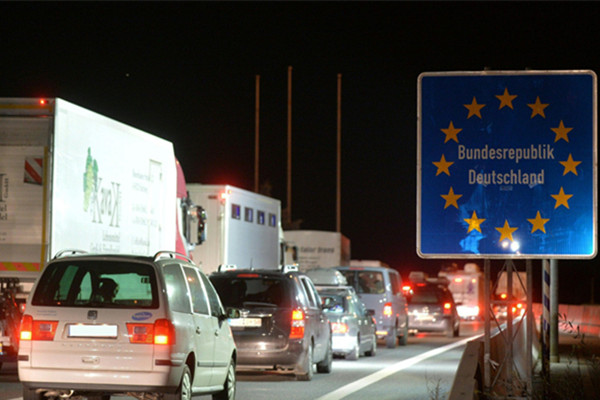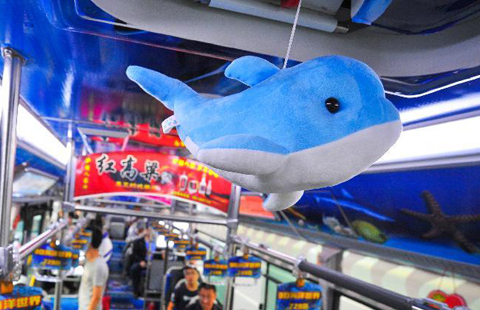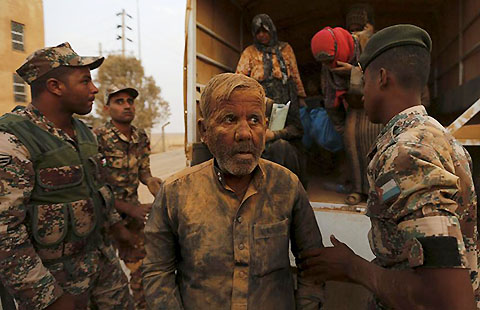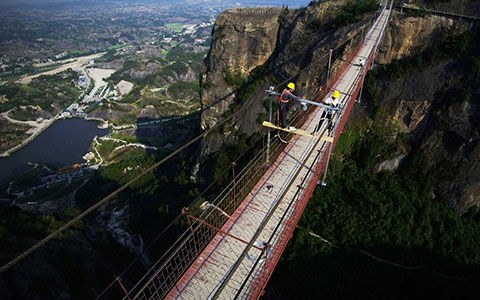Germany re-imposes border controls to slow migrant arrivals
Updated: 2015-09-14 07:29
(Agencies)
|
||||||||
 |
|
Traffic jam from Austria to Germany at the border between Salzburg in Austria and Walserberg, Bavaria, Germany, late Sept 13, 2015. Sign reads Federal Republic of Germany. [Photo/IC] |
BERLIN/BRUSSELS - Germany re-imposed border controls on Sunday after Europe's most powerful nation acknowledged it could scarcely cope with thousands of asylum seekers arriving every day.
A day before deeply divided European Union ministers tackle the migrant crisis, the UN refugee agency also called on every member state to take in a share of asylum-seekers under a Brussels plan which some countries are fiercely resisting.
Berlin announced that the temporary measure would be taken first on the southern frontier with Austria, where migrant arrivals have soared since Chancellor Angela Merkel effectively opened German borders to refugees a week ago.
"The aim of these measures is to limit the current inflows to Germany and to return to orderly procedures when people enter the country," said German Interior Minister Thomas de Maiziere.
Open borders among the European countries which signed the Schengen Treaty are a crucial part of the EU project but controls can be re-introduced, provided they are only temporary.
"The free movement of people under Schengen is a unique symbol of European integration," the EU's executive Commission said in a statement. "However, the other side of the coin is a better joint management of our external borders and more solidarity in coping with the refugee crisis."
At an emergency meeting on Monday, interior ministers from the EU's 28 member states will discuss Commission proposals to redistribute about 160,000 asylum seekers across the bloc.
"We need swift progress on the Commission's proposals now," the Commission said in a statement issued as tens of thousands of people fleeing war and poverty in Syria and other parts of the Middle East, Asia and Africa made their way north.
EU envoys meeting on Sunday evening in Brussels failed to break the deadlock, with some eastern states still refusing to accept binding quotas of refugees. They argue the plan will draw more people to Europe and disrupt their homogeneous societies.
Amid the political bickering among European governments, the crisis claimed yet more lives. On Sunday 34 refugees, almost half of them babies and children, drowned off a Greek island when their boat sank, the coastguard said.

 Man tries to sell kidney for iPhone 6s
Man tries to sell kidney for iPhone 6s
 Gems of Chinese painting at Sotheby's HK auction
Gems of Chinese painting at Sotheby's HK auction
 NYFW: Tommy Hilfiger Spring/Summer 2016 collection
NYFW: Tommy Hilfiger Spring/Summer 2016 collection
 Bus decorated with 3D painting goes into service
Bus decorated with 3D painting goes into service
 Top 10 tire companies in the world
Top 10 tire companies in the world Djokovic beats Federer to win second US Open title
Djokovic beats Federer to win second US Open title
 The world in photos: Sept 7-13
The world in photos: Sept 7-13
 Hanging in the air: Workers risk life on a suspension bridge
Hanging in the air: Workers risk life on a suspension bridge
Most Viewed
Editor's Picks

|

|

|

|

|

|
Today's Top News
Parade attendees tell Houston of honor
Boeing plan for finishing center to stir up China market
Illegal margin debts probe won't crash markets: CSRC
Prisoners on death row to get free legal aid
Kissinger anticipates promising China-US ties
Germany re-imposes border controls to slow migrant arrivals
Thousands flee California wildfire as homes go up in flames
Museum crowds wait six hours to see ancient scroll
US Weekly

|

|








